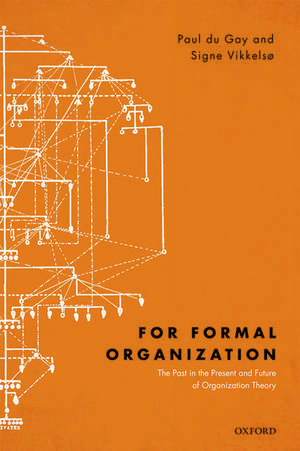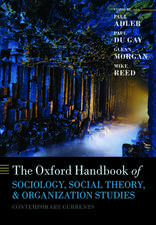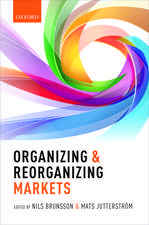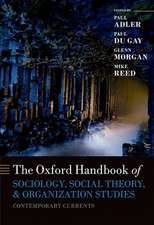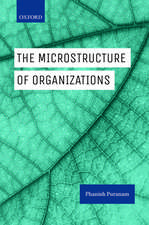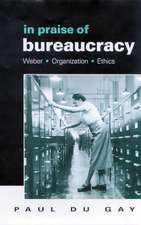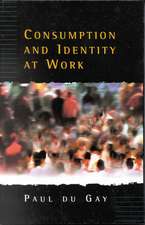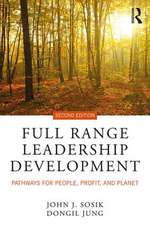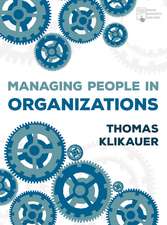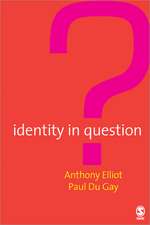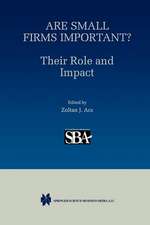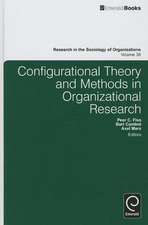For Formal Organization: The Past in the Present and Future of Organization Theory
Autor Paul du Gay, Signe Vikkelsøen Limba Engleză Hardback – 24 noi 2016
Preț: 443.36 lei
Preț vechi: 515.39 lei
-14% Nou
Puncte Express: 665
Preț estimativ în valută:
84.83€ • 88.58$ • 70.05£
84.83€ • 88.58$ • 70.05£
Carte tipărită la comandă
Livrare economică 04-10 aprilie
Preluare comenzi: 021 569.72.76
Specificații
ISBN-13: 9780198705123
ISBN-10: 0198705123
Pagini: 222
Dimensiuni: 160 x 241 x 18 mm
Greutate: 0.49 kg
Editura: OUP OXFORD
Colecția OUP Oxford
Locul publicării:Oxford, United Kingdom
ISBN-10: 0198705123
Pagini: 222
Dimensiuni: 160 x 241 x 18 mm
Greutate: 0.49 kg
Editura: OUP OXFORD
Colecția OUP Oxford
Locul publicării:Oxford, United Kingdom
Recenzii
this is an important book which pursues its thesis with passion, erudition and lucidity, seeking to restore formal organization as the proper object of our discipline and the guiding principle for organizational action. It demands to be read attentively and is the kind of monograph that restores one's faith in the willingness of some scholars today to engage with the big questions facing the discipline. It especially demands to be taken seriously as an attempt to restore formal organization as a defence against arbitrary executive power, hype and pseudo-charisma.
This book really does need to be widely read. It is a thoroughly enlightening cultural account, throwing its illuminations upon many of the habits of thought that pervade academic, popular and government discourse.
Organization theory has suffered recently from justifiable criticisms of being monotheistically consumed by overly abstract theories that deny managerial agency and have contributed to its' growing irrelevance. Paul du Gay and Signe Vikkelso have written an important book that offers salvation. For Formal Organization offers a thoughtful realignment of organization theory. Using classic texts and practical contemporary questions the authors (finally) present a compelling argument for why we need more organization theory. This is an absolutely marvellous book.
A work of stunning originality and yet paradoxically a reminder of the forgotten virtues and verities of classical organization theory. In this provocative book du Gay and Vikkelsø navigate a way out of many of the blind alleys of much recent work in the field. Lucid and scholarly, it deserves to become a landmark contribution to organization theory in the 21st century.
This book fundamentally questions the direction of intellectual travel that organization theory has followed over the last half-century. By mounting a direct and sustained challenge to the, now dominant, 'metaphysical stance' and the theories it has legitimated, du Gay and Vikkelso offer a very different and distinctive conception of how 'organization' should be studied and practiced to that promulgated by new orthodoxies such as neo-institutional theory.
Early theories of organization had a practical aim of getting things done. This practical focus has long been displaced by a more metaphysical approach, at a cost of losing formal organization as an object of study. Du Gay and Vikkelso challenge us to recover the practical focus of organization theory for a world that increasingly needs what organization theory has to offer.
For Formal Organization offers a detailed account of the need to approach Organization Theory from a formal point of view. The authors explain in minute detail the consequences of ignoring organizations' empirical (legal) reality. They show that the dominant metaphysical stance in Organization Theory leads to the creation of elaborate theoretical simulacra (such as the 'nexus of contracts' approach, or 'institutional fields') deemed to better represent reality than the formal view of organizations.
This book really does need to be widely read. It is a thoroughly enlightening cultural account, throwing its illuminations upon many of the habits of thought that pervade academic, popular and government discourse.
Organization theory has suffered recently from justifiable criticisms of being monotheistically consumed by overly abstract theories that deny managerial agency and have contributed to its' growing irrelevance. Paul du Gay and Signe Vikkelso have written an important book that offers salvation. For Formal Organization offers a thoughtful realignment of organization theory. Using classic texts and practical contemporary questions the authors (finally) present a compelling argument for why we need more organization theory. This is an absolutely marvellous book.
A work of stunning originality and yet paradoxically a reminder of the forgotten virtues and verities of classical organization theory. In this provocative book du Gay and Vikkelsø navigate a way out of many of the blind alleys of much recent work in the field. Lucid and scholarly, it deserves to become a landmark contribution to organization theory in the 21st century.
This book fundamentally questions the direction of intellectual travel that organization theory has followed over the last half-century. By mounting a direct and sustained challenge to the, now dominant, 'metaphysical stance' and the theories it has legitimated, du Gay and Vikkelso offer a very different and distinctive conception of how 'organization' should be studied and practiced to that promulgated by new orthodoxies such as neo-institutional theory.
Early theories of organization had a practical aim of getting things done. This practical focus has long been displaced by a more metaphysical approach, at a cost of losing formal organization as an object of study. Du Gay and Vikkelso challenge us to recover the practical focus of organization theory for a world that increasingly needs what organization theory has to offer.
For Formal Organization offers a detailed account of the need to approach Organization Theory from a formal point of view. The authors explain in minute detail the consequences of ignoring organizations' empirical (legal) reality. They show that the dominant metaphysical stance in Organization Theory leads to the creation of elaborate theoretical simulacra (such as the 'nexus of contracts' approach, or 'institutional fields') deemed to better represent reality than the formal view of organizations.
Notă biografică
Paul du Gay has published extensively in sociology, cultural studies, public management and organization studies. He is the author inter alia of Consumption and Identity at Work and In Praise of Bureaucracy. His recent publications include New Spirits of Capitalism? Crises, Justifications and Dynamics (ed. with G. Morgan, OUP) and The Oxford Handbook of Sociology, Social Theory and Organization Studies: Contemporary Currents (with P. Adler, G. Morgan, and M. Reed eds., OUP). At CBS he is Academic Director of the School's Public Private Platform and leads the Velux Foundation project 'Office as a Vocation'.Signe Vikkelsø's research focuses on organizational analysis and the organizing effects of tools and techniques in work practices and human relations. Drawing upon cases from healthcare, psychoanalysis, and industrial production she has published in sociology of science and technology, psychology, CSCW and organization studies. Her recent publications include a comprehensive Handbook in Classic and Modern Organization Theory (ed. with P. Kjær, Hans Reitzels Forlag). At CBS she is head of the Department of Organization, and member of the Research, Innovation and Organization Cluster.
